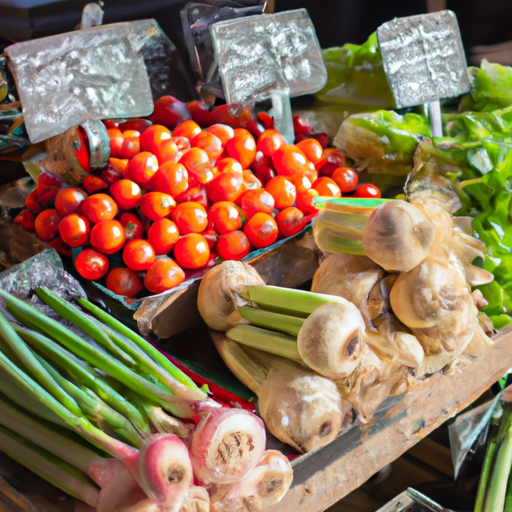Are you curious about the role that culture plays in influencing a person’s decision to adopt a vegan lifestyle? Culture, with its rich tapestry of traditions, beliefs, and values, has a profound impact on our choices and behaviors. When it comes to embracing a vegan way of life, cultural influences can be both empowering and challenging.
Cultural traditions and food practices are deeply ingrained within us, shaping our preferences and habits from an early age. Social norms and peer influence also play a significant role in determining what we choose to eat. Additionally, personal beliefs and values strongly impact our dietary decisions.
The availability of plant-based options is another crucial factor influenced by culture.
Cultural perceptions of health and wellness further contribute to how individuals perceive the benefits of a vegan lifestyle. Religious and spiritual influences can also guide one’s dietary choices.
Education and awareness serve as catalysts for change within cultural contexts.
By understanding the diverse ways in which culture impacts our decisions, we can navigate this journey towards adopting a vegan lifestyle with greater empathy, support, and belonging.
Key Takeaways
- Culture strongly influences a person’s decision to adopt a vegan lifestyle.
- Cultural traditions and food practices shape preferences and habits related to veganism.
- Social norms and peer influence play a significant role in determining dietary choices, including the decision to adopt a vegan lifestyle.
- Personal beliefs and values, including ethical considerations and environmental sustainability, strongly impact a person’s decision to embrace veganism.
Cultural Traditions and Food Practices
You may find it challenging to break away from cultural traditions and food practices that have been deeply ingrained in your upbringing, but embracing a vegan lifestyle can open new doors of enlightenment and compassion.
Cultural preservation is important, as it helps us maintain our identity and connect with our roots. It is essential to recognize that cultural practices evolve over time, and adopting a vegan lifestyle does not mean abandoning your heritage.
Food plays a significant role in culture, symbolizing values, beliefs, and social connections. Many cultures have traditional dishes that are deeply rooted in animal products.
These dishes often hold sentimental value and are shared during special occasions or family gatherings. The fear of losing these cherished traditions can make transitioning to a vegan lifestyle seem daunting.
However, incorporating dietary restrictions into cultural practices is not unprecedented.
Throughout history, cultures have adapted their cuisines to accommodate changing circumstances or beliefs. Embracing veganism can be seen as an extension of this adaptability.
By adopting a vegan lifestyle while honoring cultural traditions, you can contribute to the preservation of your heritage while also promoting compassion towards animals and environmental sustainability.
It is possible to create delicious plant-based versions of traditional dishes or explore new recipes inspired by different cultures.
Remember that belonging does not solely depend on adhering to specific food practices; it lies in the shared values and connections we establish with others who embrace similar principles of compassion and respect for all living beings.
Social Norms and Peer Influence
Immerse yourself in a community where social norms and peer influence shape the way individuals embrace plant-based eating. In this culture, media influence and advertising play a significant role in promoting the vegan lifestyle.
You’ll find billboards, commercials, and social media campaigns that showcase the benefits of choosing plant-based foods.
These messages are designed to make you feel like you’re part of something bigger, a movement towards healthier living and environmental sustainability.
Within this community, the influence of family and close friends is also crucial. Imagine attending gatherings where everyone brings delicious vegan dishes to share.
Your loved ones inspire you with their commitment to cruelty-free living, making it easier for you to adopt a similar lifestyle.
They offer support, advice, and even share recipes that have been passed down through generations.
As you navigate through this world influenced by social norms and peer pressure, remember that belonging is paramount.
The desire to fit in drives many people’s decisions to adopt a vegan lifestyle. By aligning yourself with like-minded individuals who value compassion for animals and sustainable living, you’ll find a sense of acceptance and understanding.
So join this vibrant community where media influence, supportive friends and family shape your decision-making process.
Embrace the power of culture as it guides you towards adopting a vegan lifestyle filled with purpose and connection.
Personal Beliefs and Values
Within this community, individuals are driven by their personal beliefs and values to embrace a plant-based lifestyle that aligns with their ethical principles and commitment to sustainability.
Personal beliefs play a significant role in influencing the decision to adopt a vegan lifestyle.
Many individuals choose to go vegan because they believe it is morally wrong to harm animals for food. They feel a strong sense of empathy towards animals and view them as sentient beings deserving of compassion and respect.
In addition, personal values related to environmental impact also contribute to the adoption of a vegan lifestyle. Vegans often prioritize sustainability and recognize that animal agriculture has a substantial negative impact on the environment.
Livestock farming contributes significantly to greenhouse gas emissions, deforestation, water pollution, and resource depletion.
By choosing a plant-based diet, individuals can reduce their carbon footprint and make a positive difference in preserving the planet for future generations.
To better understand how personal beliefs and values influence the decision-making process when adopting a vegan lifestyle, let’s take a look at the following table:
| Personal Beliefs | Environmental Impact |
|---|---|
| Ethical considerations | Reducing greenhouse gas emissions |
| Compassion towards animals | Preserving natural resources |
| Animal rights advocacy | Mitigating deforestation |
By considering these factors, individuals find alignment between their personal beliefs/values and the ethical considerations/environmental impact associated with adopting a vegan lifestyle.
This sense of alignment provides them with fulfillment and strengthens their commitment to the community that shares similar values.
Availability of Plant-Based Options
When considering the availability of plant-based options, you may find that access to vegan-friendly restaurants and grocery stores plays a crucial role.
It’s important to have convenient places where you can easily find and purchase vegan products or enjoy a delicious plant-based meal.
Additionally, the availability of plant-based ingredients in local cuisine can greatly impact your ability to maintain a vegan lifestyle, as it determines whether you have diverse and nutritious options when dining out or trying new dishes.
Access to vegan-friendly restaurants and grocery stores
With an abundance of vegan-friendly restaurants and grocery stores, it’s easier than ever for you to embrace a plant-based lifestyle.
These establishments cater to your dietary preferences by offering a wide range of delicious and cruelty-free options. Whether you’re craving a hearty burger or a refreshing smoothie, there’s something for everyone.
When it comes to local cuisine, these establishments take traditional dishes and give them a vegan twist.
Imagine indulging in mouthwatering tacos filled with flavorful plant-based meat or enjoying creamy pasta made entirely from vegetables.
The possibilities are endless!
To make your experience even more enjoyable, here’s a table highlighting some popular vegan-friendly restaurants and grocery stores in your area:
| Restaurant/Grocery Store | Location | Specialties |
|---|---|---|
| Veggie Delight | Downtown | Vegan burgers, salads |
| Green Garden Market | Suburbia | Organic produce, vegan desserts |
| Plant-Based Paradise | Uptown | Raw vegan options, smoothies |
| The Veggie Patch | City Center | Vegan pizza, wraps |
| Healthy Haven | Coastal Area | Gluten-free options, fresh juices |
By having access to these incredible dining and shopping experiences, you’ll feel like you belong to a community that supports your commitment to living a compassionate lifestyle.
Availability of plant-based ingredients in local cuisine
Exploring the local cuisine, you’ll discover a vibrant array of plant-based ingredients incorporated into traditional dishes, offering a visually enticing and delicious alternative to meat-based options.
Culinary diversity and plant-based options are at the heart of the local food culture, creating a seamless integration between veganism and traditional meals.
From flavorful stir-fried vegetables to hearty lentil stews, there is no shortage of delectable plant-based choices that cater to your dietary preferences.
The availability of these ingredients in local cuisine not only allows you to embrace a vegan lifestyle but also fosters a sense of belonging within the community.
Sharing similar dietary choices with locals reinforces the idea that your decision to adopt a vegan lifestyle aligns with their cultural values and traditions.
So take delight in discovering the flavorsome wonders that await you as you engage with the culinary tapestry of this vibrant culture.
Cultural Perceptions of Health and Wellness
Cultural perceptions strongly shape an individual’s decision to embrace a vegan lifestyle. Cultural attitudes towards veganism play a significant role in influencing people’s choices regarding their diet and overall wellness.
The impact of media on cultural perceptions cannot be underestimated, as it shapes our beliefs about what is considered healthy and acceptable.
Here are some key points to consider:
-
Community: People seek acceptance and belonging within their cultural communities. Embracing a vegan lifestyle can either reinforce or challenge these perceptions of acceptance.
-
Tradition: Traditional diets rooted in cultural heritage may make it difficult for individuals to adopt a vegan lifestyle due to the fear of losing their connection to their cultural identity.
-
Influence: Media plays a vital role in shaping our understanding of health and wellness. Positive portrayal of vegans in the media can create curiosity and inspire individuals to explore plant-based diets.
-
Perception of Health: Cultural attitudes towards health often revolve around meat consumption as an indicator of strength and vitality. Challenging these beliefs requires education and dispelling myths about the nutritional benefits of plant-based diets.
By understanding how cultural perceptions influence people’s decisions, we can better address their concerns, provide support, and promote inclusivity within the vegan community.
Religious and Spiritual Influences
Imagine how deeply your religious and spiritual beliefs can shape the way you perceive and approach a vegan lifestyle. For many individuals, their faith plays a significant role in guiding their ethical considerations and influencing their decision to adopt a plant-based diet.
Religious teachings often emphasize compassion, kindness, and the responsibility to protect all living beings.
By embracing veganism, individuals believe they’re adhering to these principles and living in alignment with their religious values.
Moreover, religious communities are increasingly recognizing the importance of environmental sustainability.
Many faith traditions view stewardship of the Earth as a sacred duty. Adopting a vegan lifestyle is seen as an effective way to reduce one’s carbon footprint and contribute to preserving our planet for future generations.
By choosing to embrace veganism, individuals can find a sense of belonging within their religious or spiritual community that shares similar values.
They can connect with like-minded individuals who prioritize compassion for animals and environmental sustainability.
This sense of belonging fosters support, encouragement, and friendships that strengthen their commitment to maintaining a vegan lifestyle.
Religion and spirituality have a profound influence on an individual’s decision to adopt a vegan lifestyle.
Through ethical considerations rooted in compassion for all beings and concerns about environmental sustainability, individuals find connection and belonging within their faith communities while pursuing a plant-based diet.
Education and Awareness
Now that you understand how religious and spiritual influences can impact a person’s decision to adopt a vegan lifestyle, let’s explore another crucial factor: education and awareness.
In today’s interconnected world, access to educational resources plays a vital role in shaping our beliefs and behaviors.
When it comes to veganism, there is an abundance of information available that can enlighten and inspire individuals to make conscious choices about their food consumption.
From documentaries like ‘Cowspiracy’ and ‘Forks Over Knives’ to books, websites, and social media platforms dedicated to promoting plant-based living, the educational landscape surrounding veganism has expanded significantly.
Media influence also plays a significant role in spreading awareness about the ethical, environmental, and health benefits of adopting a vegan lifestyle.
Celebrities who embrace veganism often use their platform to raise awareness about animal rights or advocate for sustainable eating habits.
Additionally, mainstream media outlets regularly feature stories on the rise of plant-based diets and their positive impact on both personal health and the planet.
By providing easily accessible educational resources and using influential media platforms as catalysts for change, society can foster an environment where individuals feel empowered to make informed decisions about adopting a vegan lifestyle.
Wrapping Up: Role of Culture in Veganism
In conclusion, culture plays a significant role in influencing your decision to adopt a vegan lifestyle.
Your cultural traditions and food practices shape your dietary choices, while social norms and peer influence can impact your decision to go vegan.
Additionally, your personal beliefs and values, as well as the availability of plant-based options, play a crucial role in determining whether you choose a vegan lifestyle.
Cultural perceptions of health and wellness, religious and spiritual influences, along with education and awareness also contribute to your decision-making process.



Recent Comments